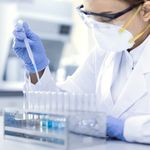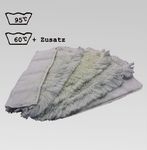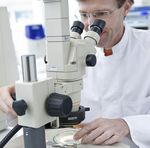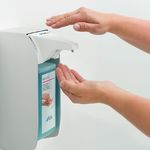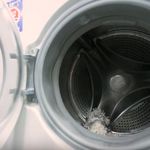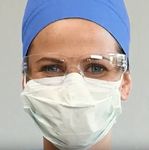HYGIENE MEASURES FOR INFECTIONS WITH THE NEW CORONA VIRUS (SARS-COV-2) - DÜRR DENTAL
←
→
Page content transcription
If your browser does not render page correctly, please read the page content below
Hygiene measures for infections with
the new corona virus (SARS-CoV-2)
Special features of the novel corona virus
What is the novel corona virus?
The new pathogen belongs to the corona virus strain. It is known
that the new pathogen is a beta coronavirus. The sequence of
genes corresponds to that of the SARS virus and all corona viruses.
Where does the new corona virus come from?
The virus probably comes from wild animals. Accordingly, there
were first transmissions from animals to humans, then transmissions
from human to human. However, no direct transition from animals
to humans is assumed, but an for now unidentified intermediate
host.
SARS-CoV-2 ‒ corona virus Incubation period
SARS-CoV-2 is a corona virus newly discovered in 2019, The incubation period from infection to the onset of the first symp-
which belongs to line B of the beta corona viruses. It is an toms is on average about 3 days. Hospitalization usually takes
enveloped virus. The virus appeared in the city of Wuhan place after another 4 to 5 days. However, the incubation period is
(China) in late 2019. The SARS-CoV-2 virus genome was subject to large inter-individual fluctuations, so that a
fully sequenced in January 2020. SARS-CoV-2 causes the period of 2 to 14 days is possible. It is very similar to SARS. The
disease called COVID-19 (Corona virus disease 2019). viruses can be passed on already during the incubation period, i.e.
before the onset of symptoms. However, there is no clear evidence
of this.
Duration of contagiousness
It is believed that the time from infection to onset can be up
to 14 days.
Transmission
According to the current state of knowledge, the transfer can
be effected via
▪ Droplets
▪ Contact, e.g. with body secretions and
▪ Excrements
take place. It is not clear whether transmission also occurs by
touching contaminated surfaces and objects.
stand: 02/2020Current information Coronavirus (SARS-CoV-2) Symptoms A SARS-CoV-2 infection is initially noticeable due to unspecific general symptoms. The following symptoms can occur, among others: ▪ Fever ▪ Dry cough ▪ Muscle pains ▪ Severe breathing difficulties ▪ Lung infection Diagnostics and therapy Diagnostics Specific diagnostics must be carried out for: ▪ Persons with respiratory symptoms - regardless of their severity - and contact with a confirmed case of SARS-CoV-2 ▪ Persons with a fulfilled clinical picture and stay in a risk area 14 days before the start of the disease Laboratory: The virus can be detected directly using a diagnostic test. The sample material should be taken from both the upper and lower airways. A single negative virus detection does not rule out the infection. If the progession is severe, multiple tests are recommended. Therapy No specific therapy is currently available (January 2020). Therapy is therefore purely symptomatic. However, existing antiviral drugs are being examined. Measures Recommendations of the Robert Koch Institute (RKI) for hygiene measures in patients with confirmed infection by SARS-CoV-2: a) Spatial accommodation: ▪ Single accommodation in an isolation room with its own bathroom. ▪ The use of an isolation room with airlock/anteroom is generally preferred. ▪ If a ventilation and air-conditioning system is operated in the patient rooms, via which it is possible for air to spread to other rooms, this must be turned off. ▪ Visitors must be kept to a minimum and instructed on personal safety measures.
Current information Coronavirus (SARS-CoV-2) b) Personnel measures: ▪ Trained personnel assigned to the care of these patients should be released from the care of other patients as far as possible. Define and limit the number of contact persons. ▪ Protective gown, disposable gloves, hood, tight-fitting respiratory mask (protection level FFP2 or FFP3), protective goggles and long-sleeved, waterproof disposable apron during appropri- ate nursing, diagnostic or therapeutic activities on the patient. c) Procedure for the care of patients with confirmed infection: ▪ Implementation of basic hygiene measures and hand hygiene ▪ Observe the known indications for hand disinfection also in connection with changing gloves according to the 5 moments of hand hygiene ▪ Put on personal protective equipment before entering the patient room and protect against leave the lock/room there ▪ Disposable shoes or gowns before leaving the room or airlock in a dispose of closed container ▪ Hand disinfection after taking off the gloves and before leaving the room At the time of writing this recommendation, there is not yet sufficient data on the duration of pathogen excretion in persons who are no longer symptomatic to provide a general conclusive recommendation to discontinue measures once the symptoms have subsided. Further hygiene measures ▪ Daily wiping disinfection of the areas close to the patient ▪ Daily wiping disinfection of areas close to the patient If necessary, the disinfection measures should be extended to other areas at risk of contamination or contaminated areas ▪ All medical devices in direct contact with the patient are to be used patient-related and must be disinfected after use. A central preparation is possible for transport in a closed, externally disinfected container. A thermal disinfection process should, if possible, be preferred ▪ Transport dishes in a closed container to the dishwasher and wash at > 60 ° C ▪ Laundry / textiles can be subjected to a disinfecting laundry disinfection process according to the RKI list ▪ Use wipe-disinfectable covers for beds and mattresses. ▪ Disposal of waste contaminated with secretions or excretions in accordance with waste code 18 01 03 in accordance with LAGA guidelines ▪ Final disinfection is carried out with at least limited virucidal agents. Dispose of material that cannot be reprocessed ▪ When transporting patients, inform the target area / facility and the transport service ▪ After the ambulance: – Disinfect all contact surfaces – Carry out hand disinfection and washing This catalog of measures does not claim to be complete!
Current information
Coronavirus (SARS-CoV-2)
Disinfectants
▪ Use disinfectants with at least the spectrum of activity “limited virucidal”
▪ Follow the dosage and exposure times according to the manufacturer‘s instructions for the disinfectants used
▪ Reuse of disinfected areas:
Reuse of disinfected areas: According to the RKI recommendation, the area can be used again after all routine
surface disinfection measures have been carried out as soon as it is visibly dry. In certain cases, the specified
exposure time must be waited for before the area is used again.
The following Dürr System Hygiene products
work against the new type of corona virus:
Instruments
▪ ID 212 / ID 212 forter Instrument disinfection
▪ ID 213 Instrument disinfection
▪ ID 215 Enzymatic instrument cleaner
Surfaces
▪ FD 300/ FD 300 top wipes Surface disinfection
▪ FD 312/ FD 312 wet wipes Surface disinfection*
▪ FD 322/ FD 322 premium wipes/ FD 322 top wipes Quick-acting disinfection
▪ FD 333/ FD 333 wipes Quick-acting disinfection
▪ FD 333 forte/ FD 333 forte premium wipes/FD 333 forte wipes Quick-acting disinfection
▪ FD 350 Disinfection wipes
▪ FD 366 sensitive/ FD 366 sensitive wipes/ FD 366 sensitive top wipes
for disinfection of sensitive surfaces
Skin and hands
▪ HD 410 Hand disinfection
▪ HD 412 essential Hand disinfection
Spezialbereiche
▪ Orotol plus Disinfection of suction systems
▪ Orotol ultra Disinfection of suction systems
▪ MD 520 Impression disinfection
*Use biocides with caution. Always read the
label and product information before use.
Legal basis
Notification according to the Infection Protection Act (IfSG):
In Germany, according to the Infection Protection Act (Section 6), the occurrence of a threatening communicable disease must be
reported to the responsible health authority. With effect from February 1, 2020, an ordinance was passed by the Federal Ministry
of Health (authorization pursuant to Section 15 IfSG) to extend the reporting obligation. Accordingly, suspicion of illness, illness
and death as well as laboratory chemical evidence of an acute infection with the novel corona virus must be reported. The suspici-
on must only be reported if the suspicion is based on both the clinical picture and a probable epidemiological connection. This
Ordinance shall apply until 1 February 2021, unless otherwise decreed with the consent of the Federal Council.
Dürr Dental SE
Höpfigheimer Str. 17
Stand: 02/2020
74321 Bietigheim-Bissingen
Germany
www.duerrdental.com
info@duerrdental.comYou can also read




